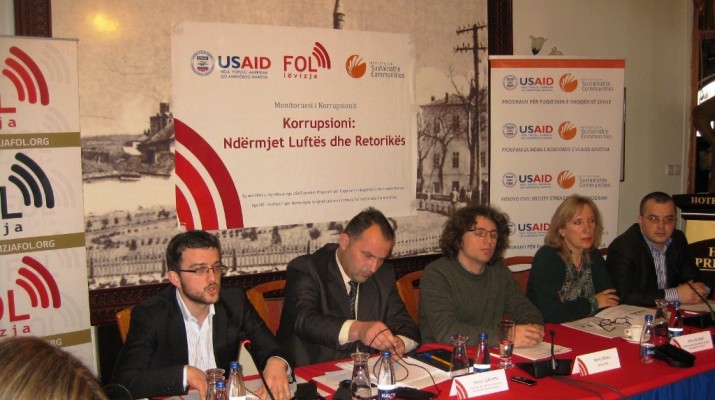Corruption: Between Fight and Rhetorics”
Prishtina, February 23, 2011 – Movement FOL, supported by USAID through the Program for Strengthening Civil Society implemented by ISC – Institute for Sustainable Communities, today held a round table on “Corruption: Between Fight and rhetoric”, and published its annual report “Corruption monitor 2010”. Participants in this table were representatives from Kosovo Prosecution, Anti-corruption Agency, Kosovo Police, Civil Society and other representatives of public institutions in Kosovo.
Policy Analyst in the Movement FOL Armend Mazreku, said that the report is a product of monitoring public institutions in fighting corruption throughout the year 2010. According to him, it has been noticed a progress in fighting corruption, but this progress has been limited and insufficient considering the high level of corruption and its widespreadof in institutions. Furthermore he presented the findings of this report, ranging from the activities of Government, Assembly, Judicial Council, Prosecution, Police, Anti -corruption Agency, Kosovo Customs, EULEX, International Reports and civil society.
The prosecutor in the District Court in Pristina and at the same time the Anti-Corruption Coordinator, Drita Hajdari, said that the report showed the actual situation of the level of corruption in Kosovo. She said that the Prosecution was working to fight corruption, which has also established a Task Force consisted of 12 prosecutors and 20 investigativepolice in fighting corruption offenses. According to her the district and municipal prosecution in the municipal of Prishtina is dealing with the half cases of the country in general. Further she said that the fight against corruption should not only be the Prosecution’s burden, but also other mechanisms” and institutions”.
The Head of the Department of Investigation of Economic Crimes and Corruption of the Kosovo Police, Shemsi Igrishta, said that Kosovo police was dealing with human capacity building, profiling the investigators and professional training in anti-corruption field. He further presented the statistics of anti-corruption within the department, where the damage caused by these acts of corruption is estimated to be about 27 million euros.
Meanwhile, the chief of the Division of Legislation and Education in Anti-Corruption Agency, Burim Sadiku, said that ACA has identified several factors that drive up the corruption in Kosovo: the lack of political will, delays in judicial reforms, the lack of supervisory mechanisms and transition. According to him, the most common forms of corruption that ACA has identified are the abuse of official position or authority, falsification of documents, taking and giving bribes and ungrounded judicial verdicts issued.
